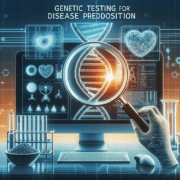"Unraveling the Link Between Genetics and Disease Susceptibility"
Unraveling the Link Between Genetics and Disease Susceptibility
As a holistic wellness healthcare specialist, it is important to understand the intricate connection between genetics and disease susceptibility. By unraveling this link, we can better tailor our approach to preventing and managing various health conditions. Here are some key insights into how genetics play a role in disease susceptibility:
The Role of Genetics in Disease Susceptibility
- Genetic Variations: Each person’s genetic makeup is unique, with variations that can impact their susceptibility to certain diseases.
- Family History: A strong family history of a particular disease can increase an individual’s risk of developing that condition.
- Gene Expression: The way genes are expressed within the body can influence disease susceptibility, even if a person has inherited certain genetic traits.
Understanding Genetic Testing
Genetic testing can provide valuable insights into an individual’s genetic makeup and their risk of developing certain diseases. Here are some key points to consider about genetic testing:
- Personalized Medicine: Genetic testing can help healthcare providers tailor treatment plans to each individual’s unique genetic profile.
- Risk Assessment: By identifying genetic markers associated with disease susceptibility, individuals can take proactive steps to prevent or manage these conditions.
- Family Planning: Genetic testing can also provide important information for individuals and couples considering starting a family, allowing them to make informed decisions about potential genetic risks.
Integrating Genetics into Holistic Wellness
When it comes to holistic wellness, understanding the role of genetics is essential for providing comprehensive care. Here are some ways to integrate genetics into your holistic healthcare practice:
- Personalized Nutrition: Tailoring dietary recommendations based on an individual’s genetic profile can optimize their overall health and reduce their risk of certain diseases.
- Optimizing Lifestyle Factors: Knowing how genetics influence disease susceptibility can help individuals make informed choices about their lifestyle habits, such as exercise and stress management.
- Preventive Care: By identifying genetic markers associated with certain diseases, healthcare providers can offer targeted preventive care to reduce the likelihood of developing these conditions.
Conclusion
It is clear that genetics play a significant role in disease susceptibility, highlighting the importance of integrating genetic insights into holistic wellness approaches. By understanding how genetics influence health outcomes, we can provide more personalized and effective care to our patients.





